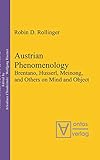Austrian Phenomenology : Brentano, Husserl, Meinong, and Others on Mind and Object / Robin D. Rollinger.
Material type: TextSeries: Phenomenology & Mind ; 12Publisher: Berlin ; Boston : De Gruyter, [2013]Copyright date: ©2008Description: 1 online resource (326 p.)Content type:
TextSeries: Phenomenology & Mind ; 12Publisher: Berlin ; Boston : De Gruyter, [2013]Copyright date: ©2008Description: 1 online resource (326 p.)Content type: - 9783110324952
- 9783110325485
- B829.5 .R65 2008eb
- online - DeGruyter
- Issued also in print.
| Item type | Current library | Call number | URL | Status | Notes | Barcode | |
|---|---|---|---|---|---|---|---|
 eBook
eBook
|
Biblioteca "Angelicum" Pont. Univ. S.Tommaso d'Aquino Nuvola online | online - DeGruyter (Browse shelf(Opens below)) | Online access | Not for loan (Accesso limitato) | Accesso per gli utenti autorizzati / Access for authorized users | (dgr)9783110325485 |
Browsing Biblioteca "Angelicum" Pont. Univ. S.Tommaso d'Aquino shelves, Shelving location: Nuvola online Close shelf browser (Hides shelf browser)

|

|

|

|

|

|

|
||
| online - DeGruyter Ways of Proof Theory / | online - DeGruyter Logic, Construction, Computation / | online - DeGruyter Church's Thesis After 70 Years / | online - DeGruyter Austrian Phenomenology : Brentano, Husserl, Meinong, and Others on Mind and Object / | online - DeGruyter Zwischen Realismus und Idealismus : Ingardens Überwindung des transzendentalen Idealismus Husserls / | online - DeGruyter Values and Ontology : Problems and Perspectives / | online - DeGruyter Noema and Thinkability : An Essay on Husserl's Theory of Intentionality / |
Frontmatter -- CONTENTS -- PREFACE -- INTRODUCTION -- BRENTANO AND HUSSERL ON IMAGINATION -- NAMES, STATEMENTS, AND MIND-FUNCTIONS IN HUSSERL’S LOGICAL INVESTIGATIONS -- MARTY ON LINGUISTIC EXPRESSIONS AND MIND-FUNCTIONS -- HUSSERL’S ELEMENTARY LOGIC: THE 1896 LECTURES IN THEIR NINETEENTH CENTURY CONTEXT -- MEINONG ON THE OBJECTS OF SENSATION -- STUMPF ON PHENOMENA AND PHENOMENOLOGY -- BRENTANO AND MEINONG -- HUSSERL AND CORNELIUS: PHENOMENOLOGY, PSYCHOLOGY, AND EPISTEMOLOGY -- MEINONG ON PERCEPTION AND OBJECTIVES -- AUSTRIAN THEORIES OF JUDGMENT: BOLZANO, BRENTANO, MEINONG, AND HUSSERL -- THE CONCEPT OF CAUSALITY IN STUMPF’S EPISTEMOLOGY -- BIBLIOGRAPHY -- Backmatter
restricted access online access with authorization star
http://purl.org/coar/access_right/c_16ec
While many of the phenomenological currents in philosophy allegedly utilize a peculiar method, the type under consideration here is characterized by Franz Brentano’s ambition to make philosophy scientific by adopting no other method but that of natural science. Brentano became particularly influential in teaching his students (such as Carl Stumpf, Anton Marty, Alexius Meinong, and Edmund Husserl) his descriptive psychology, which is concerned with mind as intentionally directed at objects. As Brentano and his students continued in their investigations in descriptive psychology, another side of Austrian phenomenology, namely object theory, became more and more prominent. The philosophical orientation under consideration in this collection of essays is accordingly a two-sided discipline, concerned with both mind and objects, and applicable to various areas of philosophy such as epistemology, philosophy of language, value theory, and ontology.
Issued also in print.
Mode of access: Internet via World Wide Web.
In English.
Description based on online resource; title from PDF title page (publisher's Web site, viewed 28. Feb 2023)


